Theories of Counselling: Case Study of a Dissatisfied Patient
VerifiedAdded on 2023/04/17
|11
|2579
|356
Essay
AI Summary
This essay delves into the realm of counselling theories, specifically focusing on the constructivist approach and its application in a case study involving a patient named Joel experiencing significant dissatisfaction and depression. The paper commences by outlining the principles and objectives of the constructivist theory, emphasizing its role in fostering improvement in challenging life situations. It then examines Joel's psychological state, exploring the impact of his past experiences and current life circumstances on his mental well-being. The essay further analyzes the counsellor's role in addressing Joel's issues, providing a conversational example to illustrate effective therapeutic techniques. Finally, the paper evaluates the advantages and disadvantages of various interventions, including one-on-one therapy and formal mental health checkups, highlighting their potential to enhance Joel's psychological development and overall well-being. The essay underscores the importance of tailoring therapeutic approaches to individual needs and leveraging positive experiences to promote resilience and personal growth.

Running head: THEORIES OF COUNSELLING
THEORIES OF COUNSELLING
Name of the Student
Name of the University
Author Note
THEORIES OF COUNSELLING
Name of the Student
Name of the University
Author Note
Paraphrase This Document
Need a fresh take? Get an instant paraphrase of this document with our AI Paraphraser
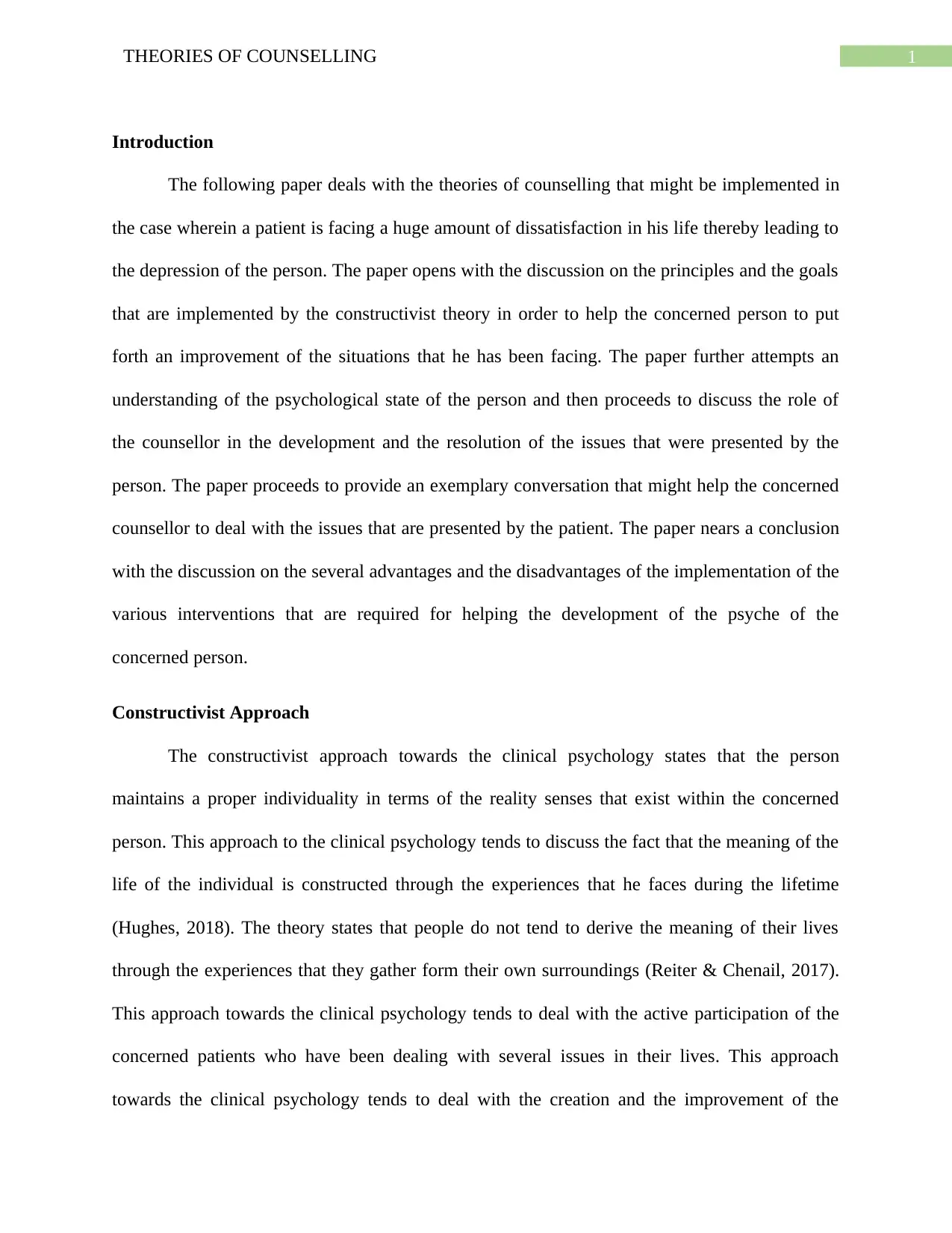
1THEORIES OF COUNSELLING
Introduction
The following paper deals with the theories of counselling that might be implemented in
the case wherein a patient is facing a huge amount of dissatisfaction in his life thereby leading to
the depression of the person. The paper opens with the discussion on the principles and the goals
that are implemented by the constructivist theory in order to help the concerned person to put
forth an improvement of the situations that he has been facing. The paper further attempts an
understanding of the psychological state of the person and then proceeds to discuss the role of
the counsellor in the development and the resolution of the issues that were presented by the
person. The paper proceeds to provide an exemplary conversation that might help the concerned
counsellor to deal with the issues that are presented by the patient. The paper nears a conclusion
with the discussion on the several advantages and the disadvantages of the implementation of the
various interventions that are required for helping the development of the psyche of the
concerned person.
Constructivist Approach
The constructivist approach towards the clinical psychology states that the person
maintains a proper individuality in terms of the reality senses that exist within the concerned
person. This approach to the clinical psychology tends to discuss the fact that the meaning of the
life of the individual is constructed through the experiences that he faces during the lifetime
(Hughes, 2018). The theory states that people do not tend to derive the meaning of their lives
through the experiences that they gather form their own surroundings (Reiter & Chenail, 2017).
This approach towards the clinical psychology tends to deal with the active participation of the
concerned patients who have been dealing with several issues in their lives. This approach
towards the clinical psychology tends to deal with the creation and the improvement of the
Introduction
The following paper deals with the theories of counselling that might be implemented in
the case wherein a patient is facing a huge amount of dissatisfaction in his life thereby leading to
the depression of the person. The paper opens with the discussion on the principles and the goals
that are implemented by the constructivist theory in order to help the concerned person to put
forth an improvement of the situations that he has been facing. The paper further attempts an
understanding of the psychological state of the person and then proceeds to discuss the role of
the counsellor in the development and the resolution of the issues that were presented by the
person. The paper proceeds to provide an exemplary conversation that might help the concerned
counsellor to deal with the issues that are presented by the patient. The paper nears a conclusion
with the discussion on the several advantages and the disadvantages of the implementation of the
various interventions that are required for helping the development of the psyche of the
concerned person.
Constructivist Approach
The constructivist approach towards the clinical psychology states that the person
maintains a proper individuality in terms of the reality senses that exist within the concerned
person. This approach to the clinical psychology tends to discuss the fact that the meaning of the
life of the individual is constructed through the experiences that he faces during the lifetime
(Hughes, 2018). The theory states that people do not tend to derive the meaning of their lives
through the experiences that they gather form their own surroundings (Reiter & Chenail, 2017).
This approach towards the clinical psychology tends to deal with the active participation of the
concerned patients who have been dealing with several issues in their lives. This approach
towards the clinical psychology tends to deal with the creation and the improvement of the
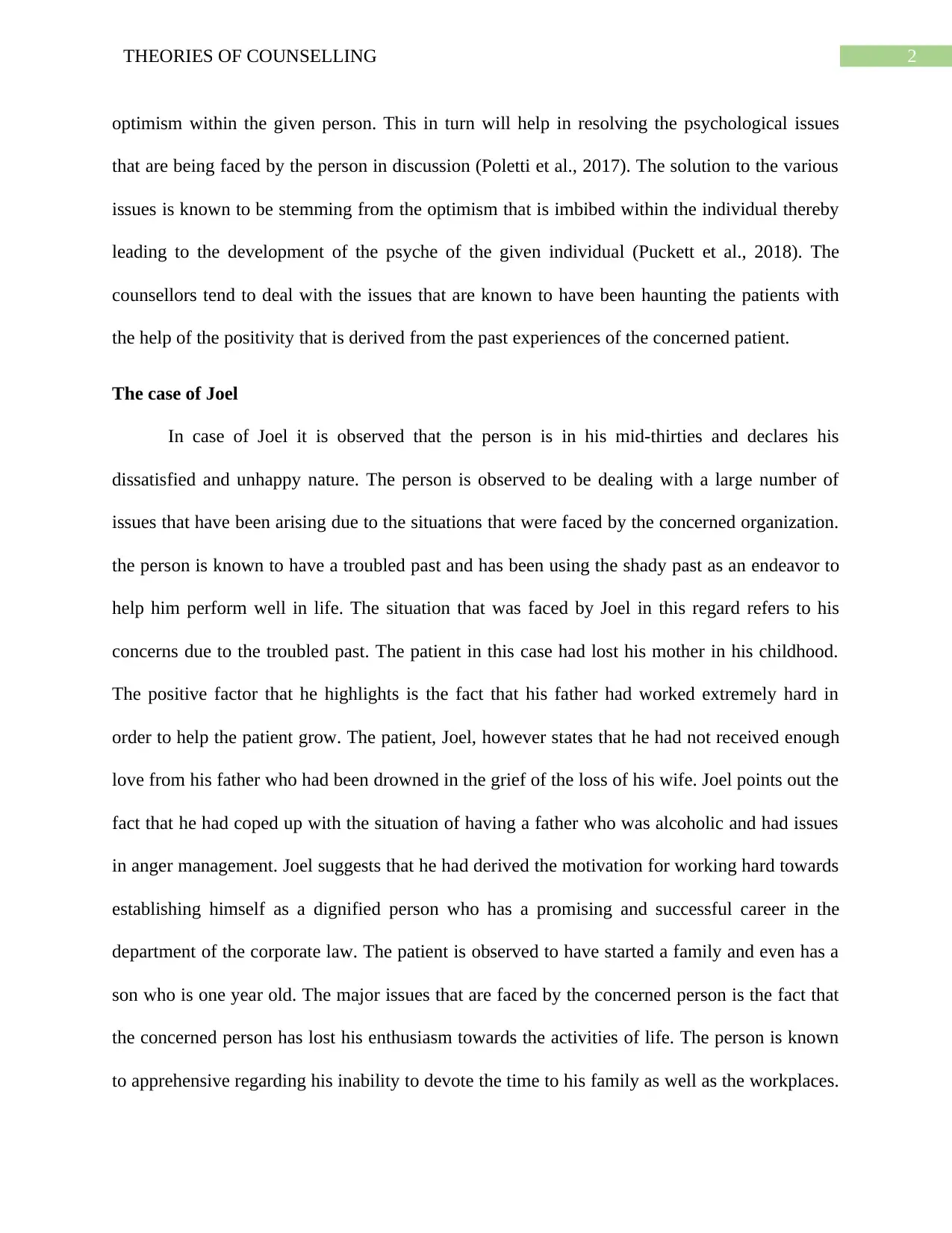
2THEORIES OF COUNSELLING
optimism within the given person. This in turn will help in resolving the psychological issues
that are being faced by the person in discussion (Poletti et al., 2017). The solution to the various
issues is known to be stemming from the optimism that is imbibed within the individual thereby
leading to the development of the psyche of the given individual (Puckett et al., 2018). The
counsellors tend to deal with the issues that are known to have been haunting the patients with
the help of the positivity that is derived from the past experiences of the concerned patient.
The case of Joel
In case of Joel it is observed that the person is in his mid-thirties and declares his
dissatisfied and unhappy nature. The person is observed to be dealing with a large number of
issues that have been arising due to the situations that were faced by the concerned organization.
the person is known to have a troubled past and has been using the shady past as an endeavor to
help him perform well in life. The situation that was faced by Joel in this regard refers to his
concerns due to the troubled past. The patient in this case had lost his mother in his childhood.
The positive factor that he highlights is the fact that his father had worked extremely hard in
order to help the patient grow. The patient, Joel, however states that he had not received enough
love from his father who had been drowned in the grief of the loss of his wife. Joel points out the
fact that he had coped up with the situation of having a father who was alcoholic and had issues
in anger management. Joel suggests that he had derived the motivation for working hard towards
establishing himself as a dignified person who has a promising and successful career in the
department of the corporate law. The patient is observed to have started a family and even has a
son who is one year old. The major issues that are faced by the concerned person is the fact that
the concerned person has lost his enthusiasm towards the activities of life. The person is known
to apprehensive regarding his inability to devote the time to his family as well as the workplaces.
optimism within the given person. This in turn will help in resolving the psychological issues
that are being faced by the person in discussion (Poletti et al., 2017). The solution to the various
issues is known to be stemming from the optimism that is imbibed within the individual thereby
leading to the development of the psyche of the given individual (Puckett et al., 2018). The
counsellors tend to deal with the issues that are known to have been haunting the patients with
the help of the positivity that is derived from the past experiences of the concerned patient.
The case of Joel
In case of Joel it is observed that the person is in his mid-thirties and declares his
dissatisfied and unhappy nature. The person is observed to be dealing with a large number of
issues that have been arising due to the situations that were faced by the concerned organization.
the person is known to have a troubled past and has been using the shady past as an endeavor to
help him perform well in life. The situation that was faced by Joel in this regard refers to his
concerns due to the troubled past. The patient in this case had lost his mother in his childhood.
The positive factor that he highlights is the fact that his father had worked extremely hard in
order to help the patient grow. The patient, Joel, however states that he had not received enough
love from his father who had been drowned in the grief of the loss of his wife. Joel points out the
fact that he had coped up with the situation of having a father who was alcoholic and had issues
in anger management. Joel suggests that he had derived the motivation for working hard towards
establishing himself as a dignified person who has a promising and successful career in the
department of the corporate law. The patient is observed to have started a family and even has a
son who is one year old. The major issues that are faced by the concerned person is the fact that
the concerned person has lost his enthusiasm towards the activities of life. The person is known
to apprehensive regarding his inability to devote the time to his family as well as the workplaces.
⊘ This is a preview!⊘
Do you want full access?
Subscribe today to unlock all pages.

Trusted by 1+ million students worldwide
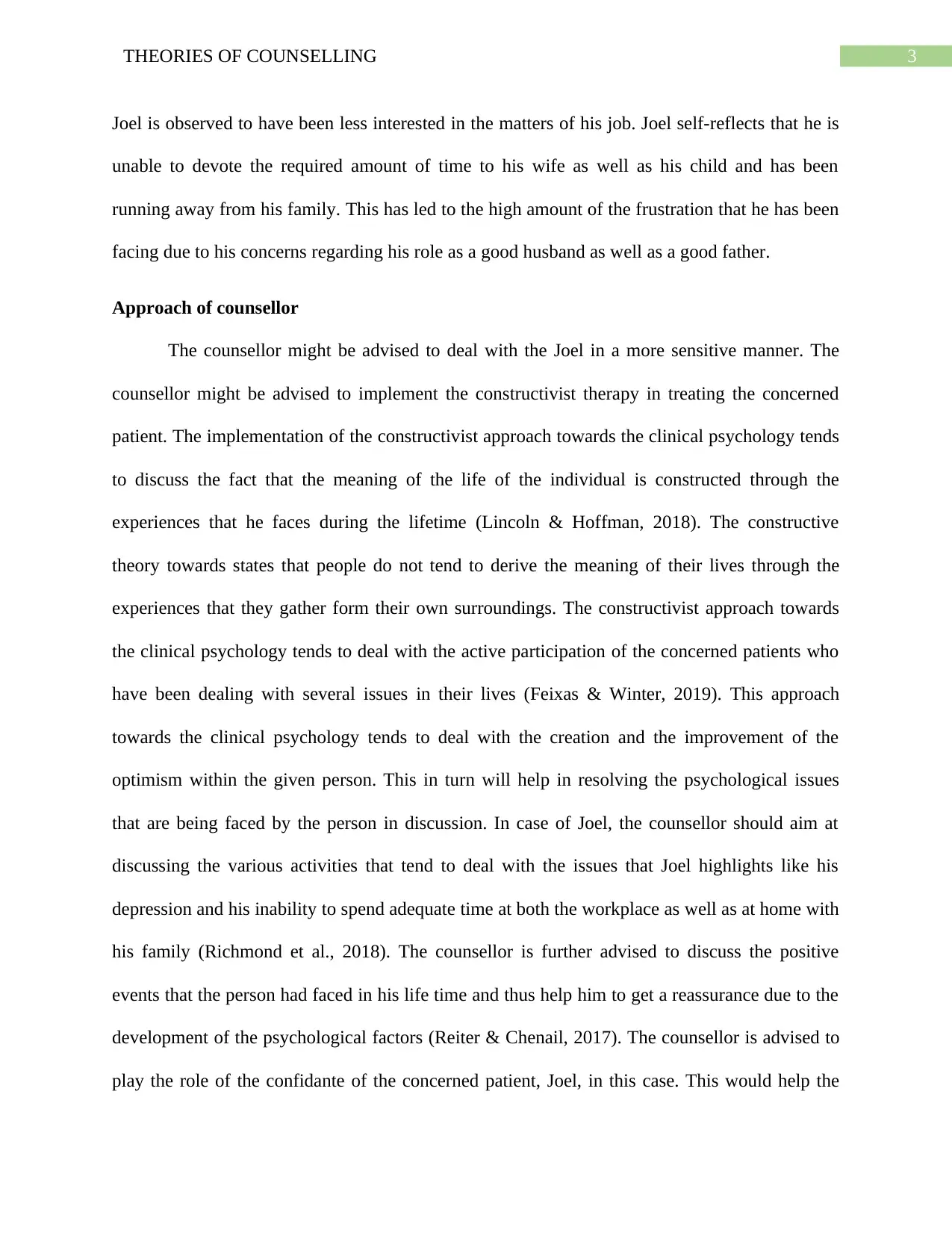
3THEORIES OF COUNSELLING
Joel is observed to have been less interested in the matters of his job. Joel self-reflects that he is
unable to devote the required amount of time to his wife as well as his child and has been
running away from his family. This has led to the high amount of the frustration that he has been
facing due to his concerns regarding his role as a good husband as well as a good father.
Approach of counsellor
The counsellor might be advised to deal with the Joel in a more sensitive manner. The
counsellor might be advised to implement the constructivist therapy in treating the concerned
patient. The implementation of the constructivist approach towards the clinical psychology tends
to discuss the fact that the meaning of the life of the individual is constructed through the
experiences that he faces during the lifetime (Lincoln & Hoffman, 2018). The constructive
theory towards states that people do not tend to derive the meaning of their lives through the
experiences that they gather form their own surroundings. The constructivist approach towards
the clinical psychology tends to deal with the active participation of the concerned patients who
have been dealing with several issues in their lives (Feixas & Winter, 2019). This approach
towards the clinical psychology tends to deal with the creation and the improvement of the
optimism within the given person. This in turn will help in resolving the psychological issues
that are being faced by the person in discussion. In case of Joel, the counsellor should aim at
discussing the various activities that tend to deal with the issues that Joel highlights like his
depression and his inability to spend adequate time at both the workplace as well as at home with
his family (Richmond et al., 2018). The counsellor is further advised to discuss the positive
events that the person had faced in his life time and thus help him to get a reassurance due to the
development of the psychological factors (Reiter & Chenail, 2017). The counsellor is advised to
play the role of the confidante of the concerned patient, Joel, in this case. This would help the
Joel is observed to have been less interested in the matters of his job. Joel self-reflects that he is
unable to devote the required amount of time to his wife as well as his child and has been
running away from his family. This has led to the high amount of the frustration that he has been
facing due to his concerns regarding his role as a good husband as well as a good father.
Approach of counsellor
The counsellor might be advised to deal with the Joel in a more sensitive manner. The
counsellor might be advised to implement the constructivist therapy in treating the concerned
patient. The implementation of the constructivist approach towards the clinical psychology tends
to discuss the fact that the meaning of the life of the individual is constructed through the
experiences that he faces during the lifetime (Lincoln & Hoffman, 2018). The constructive
theory towards states that people do not tend to derive the meaning of their lives through the
experiences that they gather form their own surroundings. The constructivist approach towards
the clinical psychology tends to deal with the active participation of the concerned patients who
have been dealing with several issues in their lives (Feixas & Winter, 2019). This approach
towards the clinical psychology tends to deal with the creation and the improvement of the
optimism within the given person. This in turn will help in resolving the psychological issues
that are being faced by the person in discussion. In case of Joel, the counsellor should aim at
discussing the various activities that tend to deal with the issues that Joel highlights like his
depression and his inability to spend adequate time at both the workplace as well as at home with
his family (Richmond et al., 2018). The counsellor is further advised to discuss the positive
events that the person had faced in his life time and thus help him to get a reassurance due to the
development of the psychological factors (Reiter & Chenail, 2017). The counsellor is advised to
play the role of the confidante of the concerned patient, Joel, in this case. This would help the
Paraphrase This Document
Need a fresh take? Get an instant paraphrase of this document with our AI Paraphraser
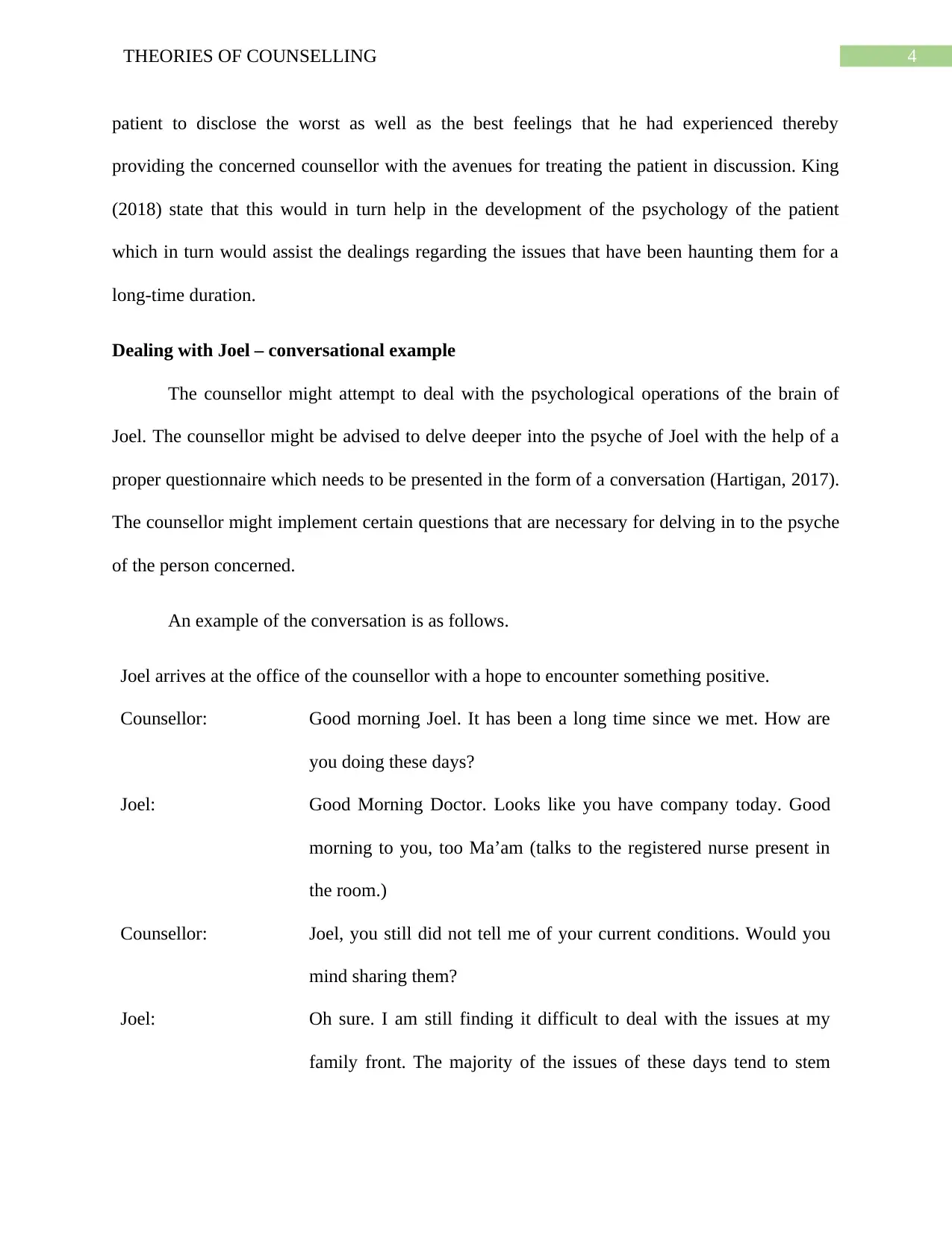
4THEORIES OF COUNSELLING
patient to disclose the worst as well as the best feelings that he had experienced thereby
providing the concerned counsellor with the avenues for treating the patient in discussion. King
(2018) state that this would in turn help in the development of the psychology of the patient
which in turn would assist the dealings regarding the issues that have been haunting them for a
long-time duration.
Dealing with Joel – conversational example
The counsellor might attempt to deal with the psychological operations of the brain of
Joel. The counsellor might be advised to delve deeper into the psyche of Joel with the help of a
proper questionnaire which needs to be presented in the form of a conversation (Hartigan, 2017).
The counsellor might implement certain questions that are necessary for delving in to the psyche
of the person concerned.
An example of the conversation is as follows.
Joel arrives at the office of the counsellor with a hope to encounter something positive.
Counsellor: Good morning Joel. It has been a long time since we met. How are
you doing these days?
Joel: Good Morning Doctor. Looks like you have company today. Good
morning to you, too Ma’am (talks to the registered nurse present in
the room.)
Counsellor: Joel, you still did not tell me of your current conditions. Would you
mind sharing them?
Joel: Oh sure. I am still finding it difficult to deal with the issues at my
family front. The majority of the issues of these days tend to stem
patient to disclose the worst as well as the best feelings that he had experienced thereby
providing the concerned counsellor with the avenues for treating the patient in discussion. King
(2018) state that this would in turn help in the development of the psychology of the patient
which in turn would assist the dealings regarding the issues that have been haunting them for a
long-time duration.
Dealing with Joel – conversational example
The counsellor might attempt to deal with the psychological operations of the brain of
Joel. The counsellor might be advised to delve deeper into the psyche of Joel with the help of a
proper questionnaire which needs to be presented in the form of a conversation (Hartigan, 2017).
The counsellor might implement certain questions that are necessary for delving in to the psyche
of the person concerned.
An example of the conversation is as follows.
Joel arrives at the office of the counsellor with a hope to encounter something positive.
Counsellor: Good morning Joel. It has been a long time since we met. How are
you doing these days?
Joel: Good Morning Doctor. Looks like you have company today. Good
morning to you, too Ma’am (talks to the registered nurse present in
the room.)
Counsellor: Joel, you still did not tell me of your current conditions. Would you
mind sharing them?
Joel: Oh sure. I am still finding it difficult to deal with the issues at my
family front. The majority of the issues of these days tend to stem
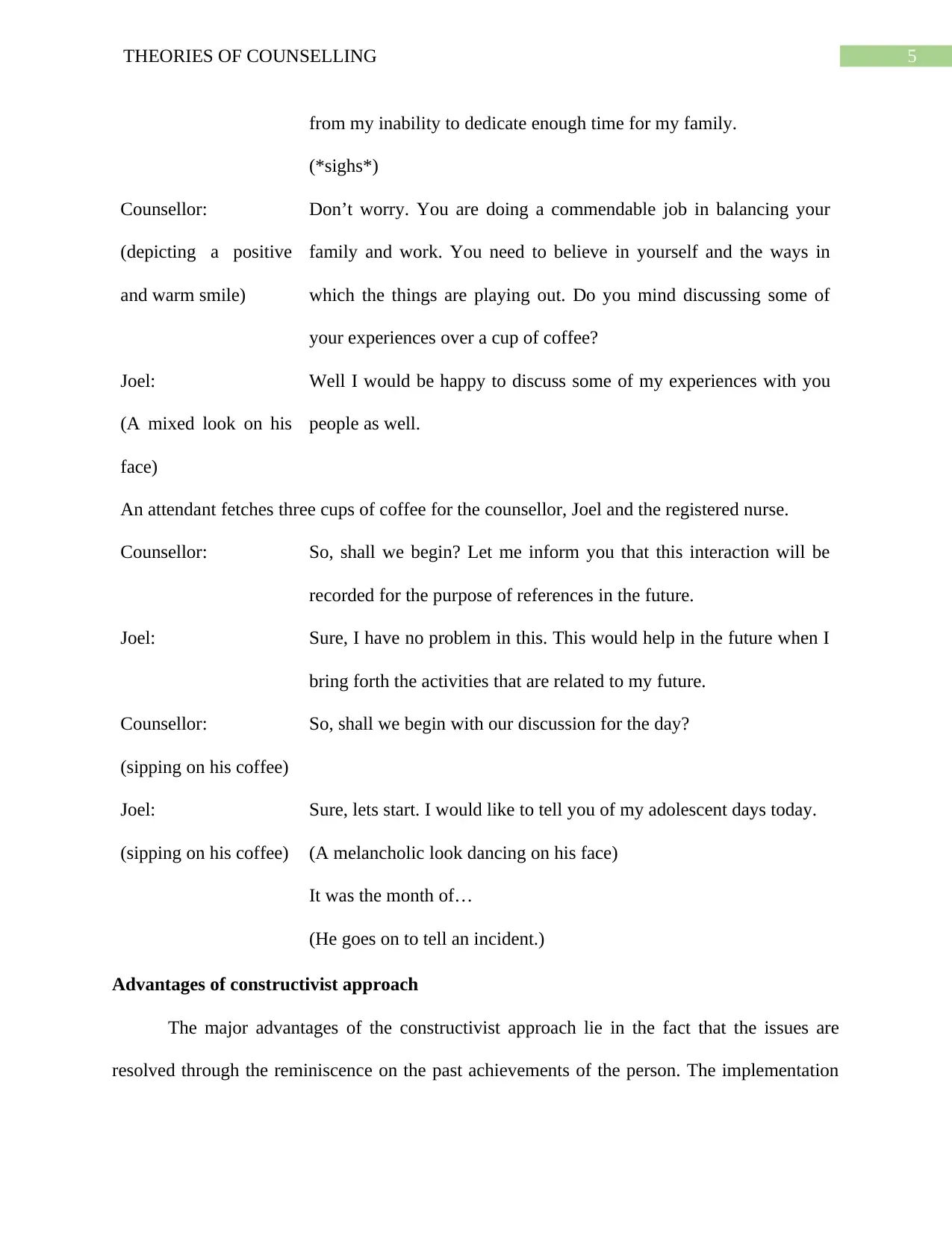
5THEORIES OF COUNSELLING
from my inability to dedicate enough time for my family.
(*sighs*)
Counsellor:
(depicting a positive
and warm smile)
Don’t worry. You are doing a commendable job in balancing your
family and work. You need to believe in yourself and the ways in
which the things are playing out. Do you mind discussing some of
your experiences over a cup of coffee?
Joel:
(A mixed look on his
face)
Well I would be happy to discuss some of my experiences with you
people as well.
An attendant fetches three cups of coffee for the counsellor, Joel and the registered nurse.
Counsellor: So, shall we begin? Let me inform you that this interaction will be
recorded for the purpose of references in the future.
Joel: Sure, I have no problem in this. This would help in the future when I
bring forth the activities that are related to my future.
Counsellor:
(sipping on his coffee)
So, shall we begin with our discussion for the day?
Joel:
(sipping on his coffee)
Sure, lets start. I would like to tell you of my adolescent days today.
(A melancholic look dancing on his face)
It was the month of…
(He goes on to tell an incident.)
Advantages of constructivist approach
The major advantages of the constructivist approach lie in the fact that the issues are
resolved through the reminiscence on the past achievements of the person. The implementation
from my inability to dedicate enough time for my family.
(*sighs*)
Counsellor:
(depicting a positive
and warm smile)
Don’t worry. You are doing a commendable job in balancing your
family and work. You need to believe in yourself and the ways in
which the things are playing out. Do you mind discussing some of
your experiences over a cup of coffee?
Joel:
(A mixed look on his
face)
Well I would be happy to discuss some of my experiences with you
people as well.
An attendant fetches three cups of coffee for the counsellor, Joel and the registered nurse.
Counsellor: So, shall we begin? Let me inform you that this interaction will be
recorded for the purpose of references in the future.
Joel: Sure, I have no problem in this. This would help in the future when I
bring forth the activities that are related to my future.
Counsellor:
(sipping on his coffee)
So, shall we begin with our discussion for the day?
Joel:
(sipping on his coffee)
Sure, lets start. I would like to tell you of my adolescent days today.
(A melancholic look dancing on his face)
It was the month of…
(He goes on to tell an incident.)
Advantages of constructivist approach
The major advantages of the constructivist approach lie in the fact that the issues are
resolved through the reminiscence on the past achievements of the person. The implementation
⊘ This is a preview!⊘
Do you want full access?
Subscribe today to unlock all pages.

Trusted by 1+ million students worldwide
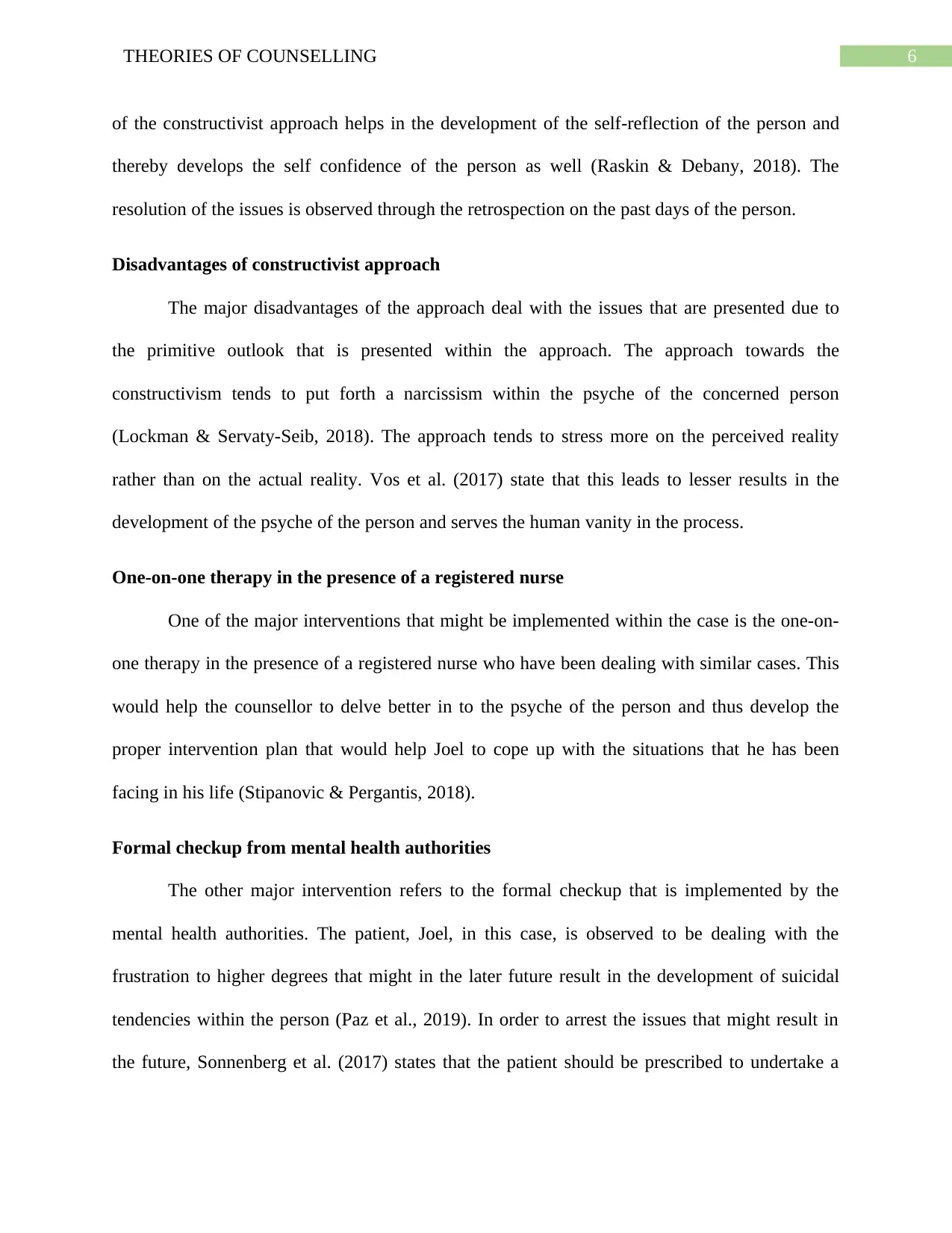
6THEORIES OF COUNSELLING
of the constructivist approach helps in the development of the self-reflection of the person and
thereby develops the self confidence of the person as well (Raskin & Debany, 2018). The
resolution of the issues is observed through the retrospection on the past days of the person.
Disadvantages of constructivist approach
The major disadvantages of the approach deal with the issues that are presented due to
the primitive outlook that is presented within the approach. The approach towards the
constructivism tends to put forth a narcissism within the psyche of the concerned person
(Lockman & Servaty-Seib, 2018). The approach tends to stress more on the perceived reality
rather than on the actual reality. Vos et al. (2017) state that this leads to lesser results in the
development of the psyche of the person and serves the human vanity in the process.
One-on-one therapy in the presence of a registered nurse
One of the major interventions that might be implemented within the case is the one-on-
one therapy in the presence of a registered nurse who have been dealing with similar cases. This
would help the counsellor to delve better in to the psyche of the person and thus develop the
proper intervention plan that would help Joel to cope up with the situations that he has been
facing in his life (Stipanovic & Pergantis, 2018).
Formal checkup from mental health authorities
The other major intervention refers to the formal checkup that is implemented by the
mental health authorities. The patient, Joel, in this case, is observed to be dealing with the
frustration to higher degrees that might in the later future result in the development of suicidal
tendencies within the person (Paz et al., 2019). In order to arrest the issues that might result in
the future, Sonnenberg et al. (2017) states that the patient should be prescribed to undertake a
of the constructivist approach helps in the development of the self-reflection of the person and
thereby develops the self confidence of the person as well (Raskin & Debany, 2018). The
resolution of the issues is observed through the retrospection on the past days of the person.
Disadvantages of constructivist approach
The major disadvantages of the approach deal with the issues that are presented due to
the primitive outlook that is presented within the approach. The approach towards the
constructivism tends to put forth a narcissism within the psyche of the concerned person
(Lockman & Servaty-Seib, 2018). The approach tends to stress more on the perceived reality
rather than on the actual reality. Vos et al. (2017) state that this leads to lesser results in the
development of the psyche of the person and serves the human vanity in the process.
One-on-one therapy in the presence of a registered nurse
One of the major interventions that might be implemented within the case is the one-on-
one therapy in the presence of a registered nurse who have been dealing with similar cases. This
would help the counsellor to delve better in to the psyche of the person and thus develop the
proper intervention plan that would help Joel to cope up with the situations that he has been
facing in his life (Stipanovic & Pergantis, 2018).
Formal checkup from mental health authorities
The other major intervention refers to the formal checkup that is implemented by the
mental health authorities. The patient, Joel, in this case, is observed to be dealing with the
frustration to higher degrees that might in the later future result in the development of suicidal
tendencies within the person (Paz et al., 2019). In order to arrest the issues that might result in
the future, Sonnenberg et al. (2017) states that the patient should be prescribed to undertake a
Paraphrase This Document
Need a fresh take? Get an instant paraphrase of this document with our AI Paraphraser
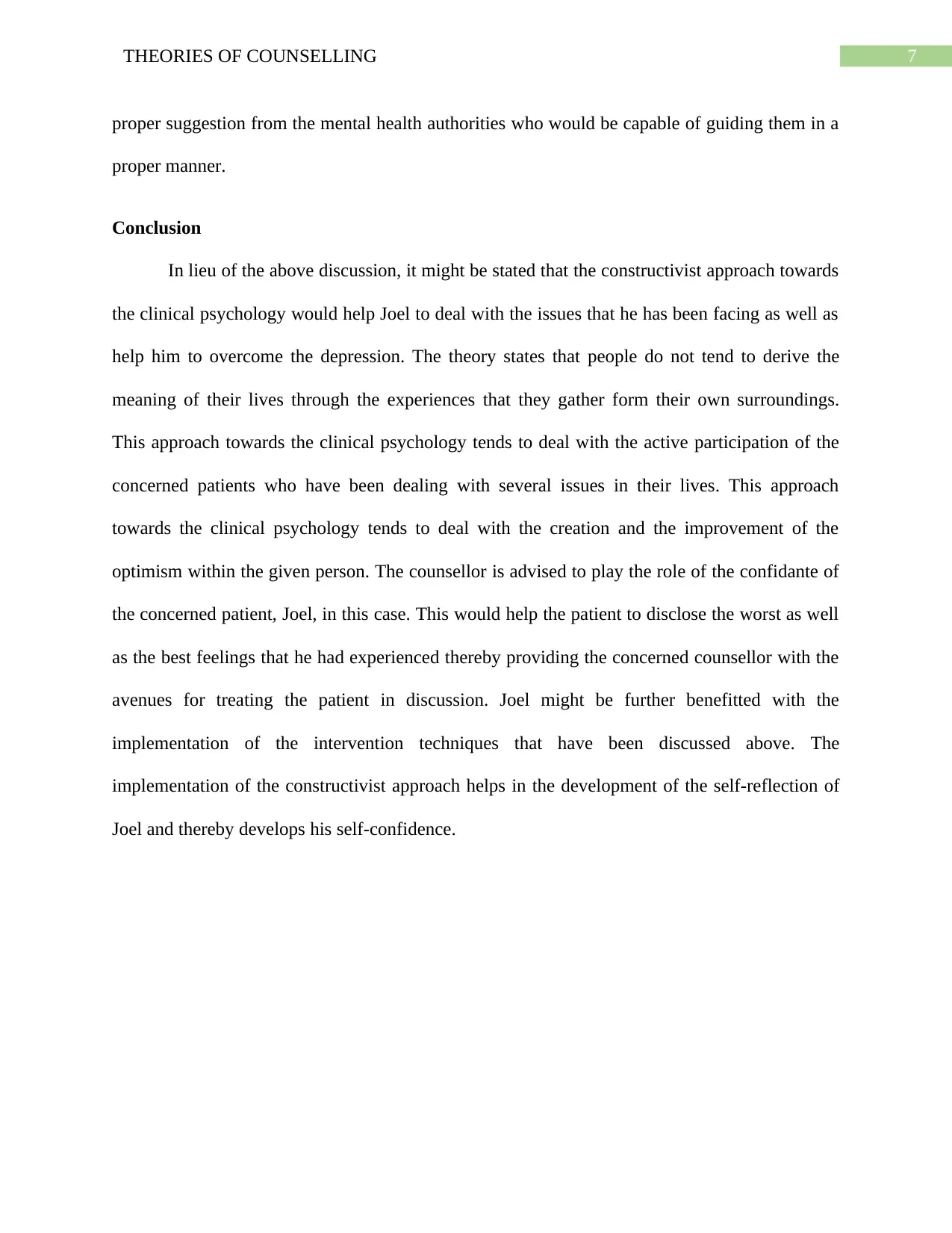
7THEORIES OF COUNSELLING
proper suggestion from the mental health authorities who would be capable of guiding them in a
proper manner.
Conclusion
In lieu of the above discussion, it might be stated that the constructivist approach towards
the clinical psychology would help Joel to deal with the issues that he has been facing as well as
help him to overcome the depression. The theory states that people do not tend to derive the
meaning of their lives through the experiences that they gather form their own surroundings.
This approach towards the clinical psychology tends to deal with the active participation of the
concerned patients who have been dealing with several issues in their lives. This approach
towards the clinical psychology tends to deal with the creation and the improvement of the
optimism within the given person. The counsellor is advised to play the role of the confidante of
the concerned patient, Joel, in this case. This would help the patient to disclose the worst as well
as the best feelings that he had experienced thereby providing the concerned counsellor with the
avenues for treating the patient in discussion. Joel might be further benefitted with the
implementation of the intervention techniques that have been discussed above. The
implementation of the constructivist approach helps in the development of the self-reflection of
Joel and thereby develops his self-confidence.
proper suggestion from the mental health authorities who would be capable of guiding them in a
proper manner.
Conclusion
In lieu of the above discussion, it might be stated that the constructivist approach towards
the clinical psychology would help Joel to deal with the issues that he has been facing as well as
help him to overcome the depression. The theory states that people do not tend to derive the
meaning of their lives through the experiences that they gather form their own surroundings.
This approach towards the clinical psychology tends to deal with the active participation of the
concerned patients who have been dealing with several issues in their lives. This approach
towards the clinical psychology tends to deal with the creation and the improvement of the
optimism within the given person. The counsellor is advised to play the role of the confidante of
the concerned patient, Joel, in this case. This would help the patient to disclose the worst as well
as the best feelings that he had experienced thereby providing the concerned counsellor with the
avenues for treating the patient in discussion. Joel might be further benefitted with the
implementation of the intervention techniques that have been discussed above. The
implementation of the constructivist approach helps in the development of the self-reflection of
Joel and thereby develops his self-confidence.
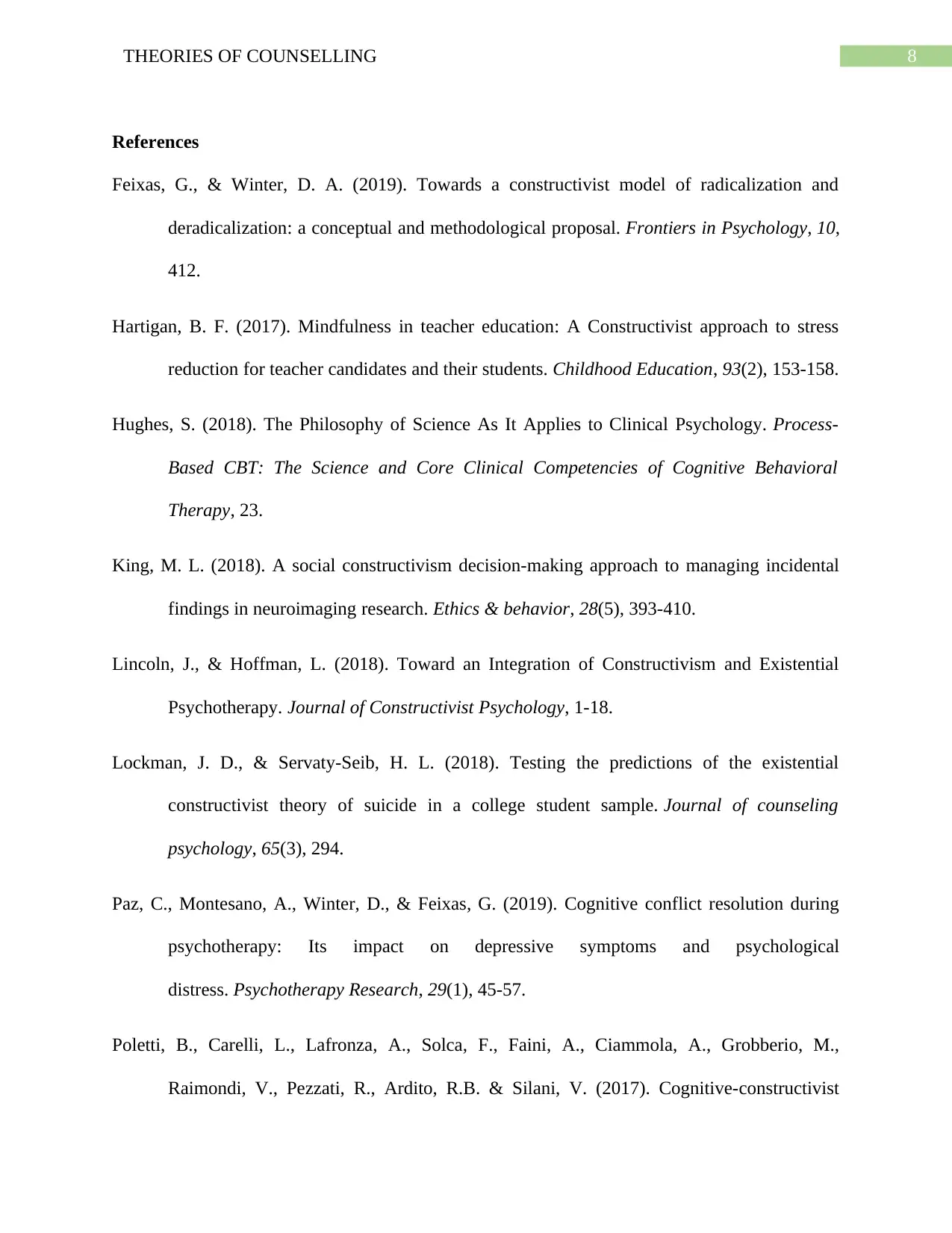
8THEORIES OF COUNSELLING
References
Feixas, G., & Winter, D. A. (2019). Towards a constructivist model of radicalization and
deradicalization: a conceptual and methodological proposal. Frontiers in Psychology, 10,
412.
Hartigan, B. F. (2017). Mindfulness in teacher education: A Constructivist approach to stress
reduction for teacher candidates and their students. Childhood Education, 93(2), 153-158.
Hughes, S. (2018). The Philosophy of Science As It Applies to Clinical Psychology. Process-
Based CBT: The Science and Core Clinical Competencies of Cognitive Behavioral
Therapy, 23.
King, M. L. (2018). A social constructivism decision-making approach to managing incidental
findings in neuroimaging research. Ethics & behavior, 28(5), 393-410.
Lincoln, J., & Hoffman, L. (2018). Toward an Integration of Constructivism and Existential
Psychotherapy. Journal of Constructivist Psychology, 1-18.
Lockman, J. D., & Servaty-Seib, H. L. (2018). Testing the predictions of the existential
constructivist theory of suicide in a college student sample. Journal of counseling
psychology, 65(3), 294.
Paz, C., Montesano, A., Winter, D., & Feixas, G. (2019). Cognitive conflict resolution during
psychotherapy: Its impact on depressive symptoms and psychological
distress. Psychotherapy Research, 29(1), 45-57.
Poletti, B., Carelli, L., Lafronza, A., Solca, F., Faini, A., Ciammola, A., Grobberio, M.,
Raimondi, V., Pezzati, R., Ardito, R.B. & Silani, V. (2017). Cognitive-constructivist
References
Feixas, G., & Winter, D. A. (2019). Towards a constructivist model of radicalization and
deradicalization: a conceptual and methodological proposal. Frontiers in Psychology, 10,
412.
Hartigan, B. F. (2017). Mindfulness in teacher education: A Constructivist approach to stress
reduction for teacher candidates and their students. Childhood Education, 93(2), 153-158.
Hughes, S. (2018). The Philosophy of Science As It Applies to Clinical Psychology. Process-
Based CBT: The Science and Core Clinical Competencies of Cognitive Behavioral
Therapy, 23.
King, M. L. (2018). A social constructivism decision-making approach to managing incidental
findings in neuroimaging research. Ethics & behavior, 28(5), 393-410.
Lincoln, J., & Hoffman, L. (2018). Toward an Integration of Constructivism and Existential
Psychotherapy. Journal of Constructivist Psychology, 1-18.
Lockman, J. D., & Servaty-Seib, H. L. (2018). Testing the predictions of the existential
constructivist theory of suicide in a college student sample. Journal of counseling
psychology, 65(3), 294.
Paz, C., Montesano, A., Winter, D., & Feixas, G. (2019). Cognitive conflict resolution during
psychotherapy: Its impact on depressive symptoms and psychological
distress. Psychotherapy Research, 29(1), 45-57.
Poletti, B., Carelli, L., Lafronza, A., Solca, F., Faini, A., Ciammola, A., Grobberio, M.,
Raimondi, V., Pezzati, R., Ardito, R.B. & Silani, V. (2017). Cognitive-constructivist
⊘ This is a preview!⊘
Do you want full access?
Subscribe today to unlock all pages.

Trusted by 1+ million students worldwide
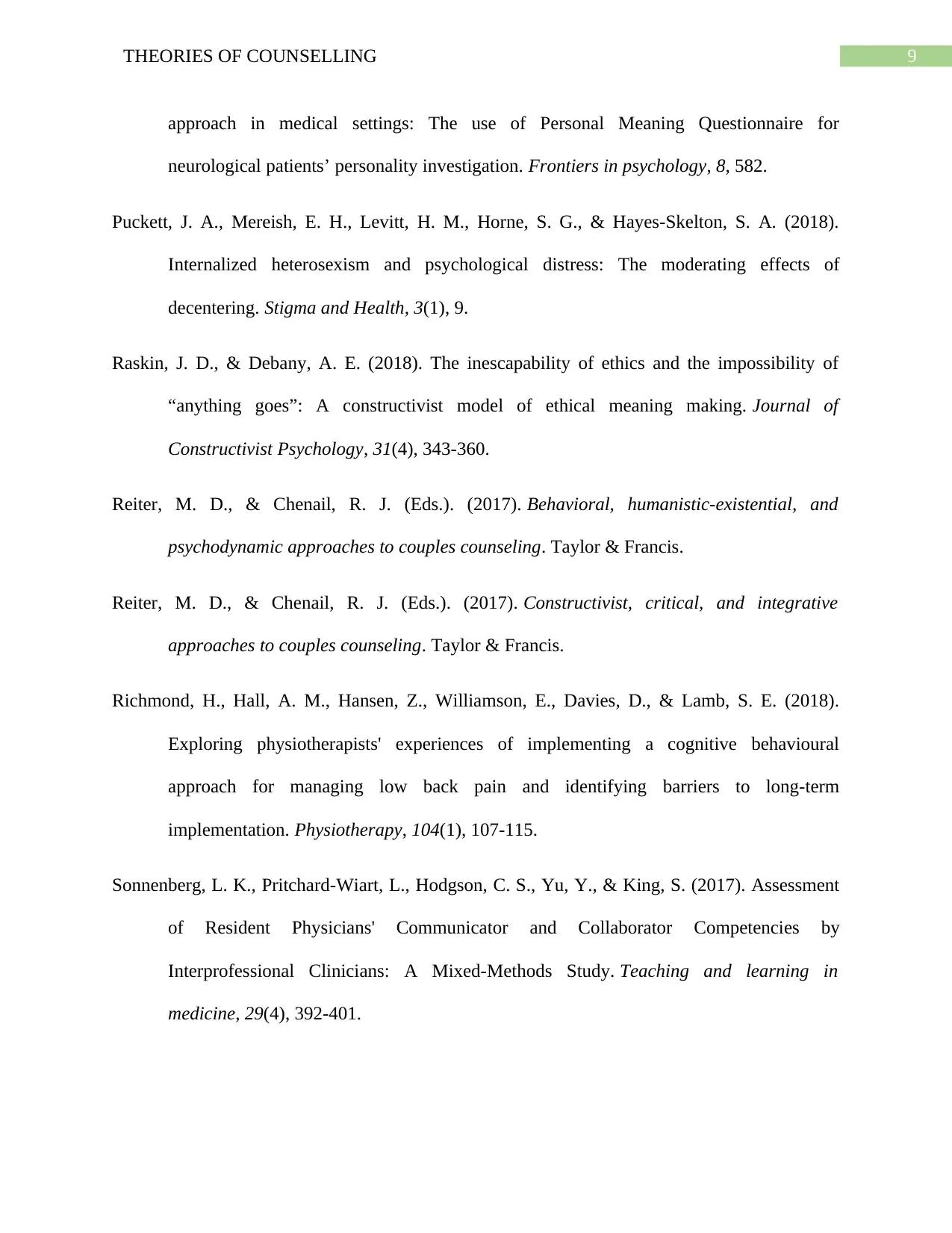
9THEORIES OF COUNSELLING
approach in medical settings: The use of Personal Meaning Questionnaire for
neurological patients’ personality investigation. Frontiers in psychology, 8, 582.
Puckett, J. A., Mereish, E. H., Levitt, H. M., Horne, S. G., & Hayes-Skelton, S. A. (2018).
Internalized heterosexism and psychological distress: The moderating effects of
decentering. Stigma and Health, 3(1), 9.
Raskin, J. D., & Debany, A. E. (2018). The inescapability of ethics and the impossibility of
“anything goes”: A constructivist model of ethical meaning making. Journal of
Constructivist Psychology, 31(4), 343-360.
Reiter, M. D., & Chenail, R. J. (Eds.). (2017). Behavioral, humanistic-existential, and
psychodynamic approaches to couples counseling. Taylor & Francis.
Reiter, M. D., & Chenail, R. J. (Eds.). (2017). Constructivist, critical, and integrative
approaches to couples counseling. Taylor & Francis.
Richmond, H., Hall, A. M., Hansen, Z., Williamson, E., Davies, D., & Lamb, S. E. (2018).
Exploring physiotherapists' experiences of implementing a cognitive behavioural
approach for managing low back pain and identifying barriers to long-term
implementation. Physiotherapy, 104(1), 107-115.
Sonnenberg, L. K., Pritchard-Wiart, L., Hodgson, C. S., Yu, Y., & King, S. (2017). Assessment
of Resident Physicians' Communicator and Collaborator Competencies by
Interprofessional Clinicians: A Mixed-Methods Study. Teaching and learning in
medicine, 29(4), 392-401.
approach in medical settings: The use of Personal Meaning Questionnaire for
neurological patients’ personality investigation. Frontiers in psychology, 8, 582.
Puckett, J. A., Mereish, E. H., Levitt, H. M., Horne, S. G., & Hayes-Skelton, S. A. (2018).
Internalized heterosexism and psychological distress: The moderating effects of
decentering. Stigma and Health, 3(1), 9.
Raskin, J. D., & Debany, A. E. (2018). The inescapability of ethics and the impossibility of
“anything goes”: A constructivist model of ethical meaning making. Journal of
Constructivist Psychology, 31(4), 343-360.
Reiter, M. D., & Chenail, R. J. (Eds.). (2017). Behavioral, humanistic-existential, and
psychodynamic approaches to couples counseling. Taylor & Francis.
Reiter, M. D., & Chenail, R. J. (Eds.). (2017). Constructivist, critical, and integrative
approaches to couples counseling. Taylor & Francis.
Richmond, H., Hall, A. M., Hansen, Z., Williamson, E., Davies, D., & Lamb, S. E. (2018).
Exploring physiotherapists' experiences of implementing a cognitive behavioural
approach for managing low back pain and identifying barriers to long-term
implementation. Physiotherapy, 104(1), 107-115.
Sonnenberg, L. K., Pritchard-Wiart, L., Hodgson, C. S., Yu, Y., & King, S. (2017). Assessment
of Resident Physicians' Communicator and Collaborator Competencies by
Interprofessional Clinicians: A Mixed-Methods Study. Teaching and learning in
medicine, 29(4), 392-401.
Paraphrase This Document
Need a fresh take? Get an instant paraphrase of this document with our AI Paraphraser
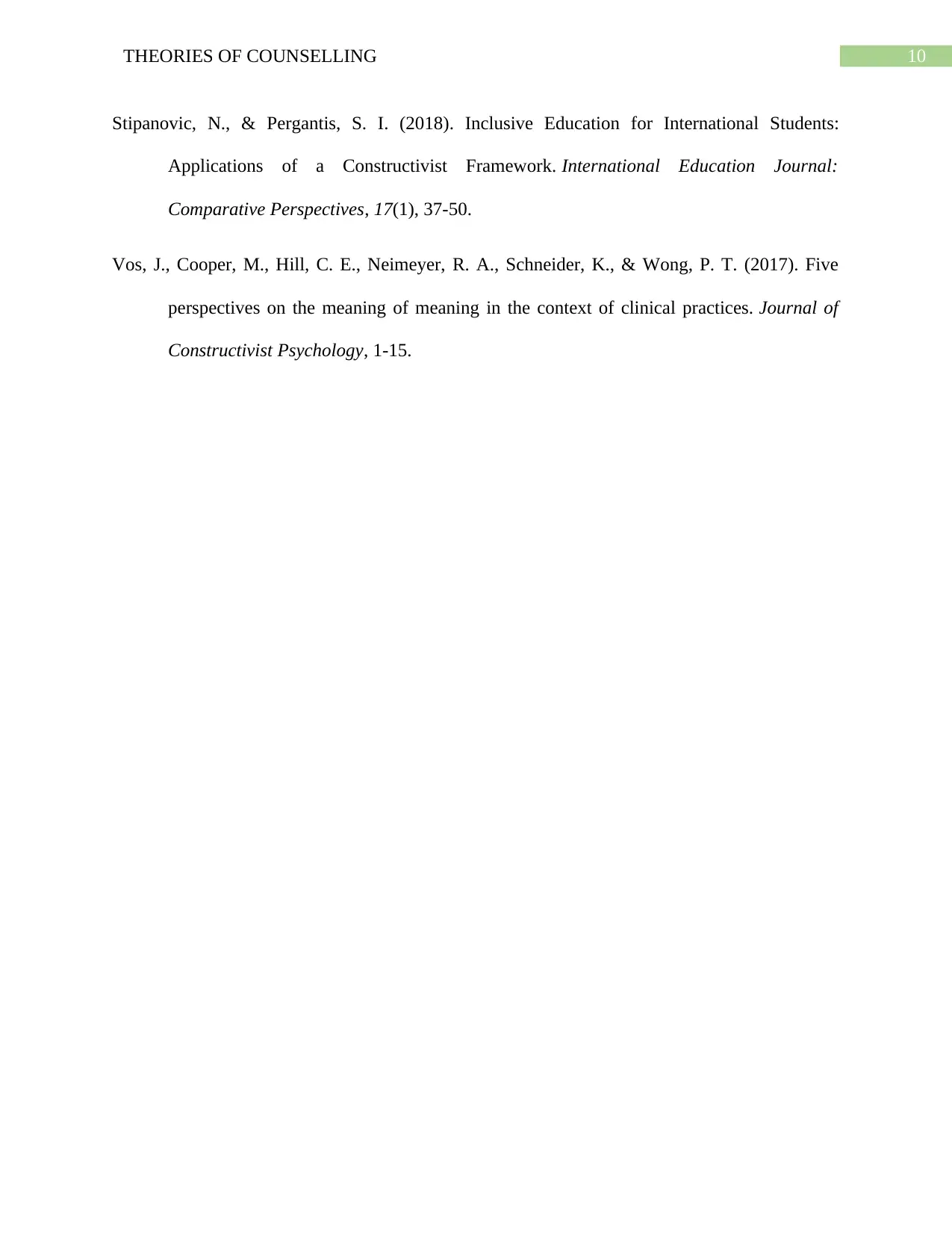
10THEORIES OF COUNSELLING
Stipanovic, N., & Pergantis, S. I. (2018). Inclusive Education for International Students:
Applications of a Constructivist Framework. International Education Journal:
Comparative Perspectives, 17(1), 37-50.
Vos, J., Cooper, M., Hill, C. E., Neimeyer, R. A., Schneider, K., & Wong, P. T. (2017). Five
perspectives on the meaning of meaning in the context of clinical practices. Journal of
Constructivist Psychology, 1-15.
Stipanovic, N., & Pergantis, S. I. (2018). Inclusive Education for International Students:
Applications of a Constructivist Framework. International Education Journal:
Comparative Perspectives, 17(1), 37-50.
Vos, J., Cooper, M., Hill, C. E., Neimeyer, R. A., Schneider, K., & Wong, P. T. (2017). Five
perspectives on the meaning of meaning in the context of clinical practices. Journal of
Constructivist Psychology, 1-15.
1 out of 11
Related Documents
Your All-in-One AI-Powered Toolkit for Academic Success.
+13062052269
info@desklib.com
Available 24*7 on WhatsApp / Email
![[object Object]](/_next/static/media/star-bottom.7253800d.svg)
Unlock your academic potential
Copyright © 2020–2025 A2Z Services. All Rights Reserved. Developed and managed by ZUCOL.





